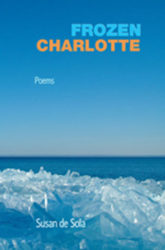Poetry Review: “Frozen Charlotte” — Plenty of Pleasure
By Ed Meek
In Frozen Charlotte, Susan de Sola provides readers with enough aesthetic pleasure and thoughtful commentary about today’s world to remind us of just how good — and necessary — poetry can be.
Frozen Charlotte by Susan de Sola. Able Muse Press, 100 pages, 19.95.

Form and meter have returned to the world of contemporary poetry with excellent poets like A.E. Stallings and Frederick Seidel and that’s a good thing. After hundreds of years of narrowing the scope of poetry, today you can find a wide range of styles and approaches, from slam and spoken word to free verse to narrative to experimental. Yes, “all poetry is experimental,” asserted Wallace Stevens. But perhaps the comeback for form and meter is one of the reasons that poetry has increased in popularity. So, the good news is that we have plenty of styles to choose from; the bad news is there’s a lot of prose masquerading as poetry — and it isn’t even good prose. When it comes to poems that employ rhyme and meter though, we’re already over the first hurdle. There is no question that we are dealing with poetry.
The use of form has advantages. It is particularly well-suited to both light, humorous verse in which the cleverness of the use of language reinforces the comedy. And it works well with weighty content — when the aesthetic rises to the occasion and heightens the powerful emotional impact of the serious subject. “Poetry is emotion put into measure,” Thomas Hardy said. Susan de Sola (a contributor to The Arts Fuse) in her wide-ranging collection Frozen Charlotte excels in both of these domains.
With poems about camels, Cary Grant, the mailman, a tear in her stockings, JFK, World War 11, and the Holocaust, there’s plenty to like. In “Wertheim Park” de Sola witnesses a woman signing to a deaf man at a memorial march in which a rabbi is reciting prayers for the millions of Jews who died in the camps. When the rabbi lists the names of the camps, however, the woman who is signing runs into a problem:
How did she sign for those names? What signs for that?
All I recall is her mouth made an O,
Her hard brows as the general hell repeated,
all the names the same: O, O, O, and O.
Auschwitz, Belzec, and Theresienstadt,
Westerbork, Drancy, Treblinka, Dachau,
A crescendo of unspecified despair.
Could she speak the names with signs? Then how?
Still, her tireless hands cut the frozen air.
There’s a poignancy to someone signing to a deaf person about the camps. A familiar subject is reconsidered from a different perspective. The fact that the only way the woman can sign is to exclaim O, seems appropriate. And the lines in the closing stanza: a “crescendo of unspecified despair” and the “hands cut the frozen air” powerfully evoke the lingering memories of the horror of the Holocaust.
In “Hollandsche Schouwburg” de Sola visits the Wall of Names and finds her own family names listed:
de Sola and Pool—the spelling just the same—
The names of cousins that I might have had.
Some thankful American dispensation,
one branch that serendipity would spare,
the trick of a forefather’s emigration,
it seemed a shameful miracle that I stood there.
Again, the rhyme emphasizes a common emotion: we feel at once lucky and guilty to have been spared such a fate. The lively mix of terms, serendipity and miracle, dispensation and shame, clash in a fashion that gives us pause, something all good art does.
In addition to weighty subjects, de Sola can be laugh out loud amusing. In “The Tear” she visits a lingerie shop for advice about a tear “in costly tights.” The proprietor immediately informs her:
Well, though it’s small, it’s a disgrace.
My dear, don’t wear a garment—ever—
That has a flaw. Oh never, never!
After all, what if she were to get in an accident? “There’s nothing sadder/than a nylon with a ladder…Be groomed. Take care. Enfin, you are your underwear.”
De Sola also has a penchant for old movies, including Bringing up Baby and North by Northwest. In a poem about the latter she writes about Cary Grant “in his perfect suit.” It’s a poem about the Hollywood persona ‘Cary Grant’ and how his image always seems too perfect.
He cuts through tweeds and Technicolor skirts,
A chiseled, dapper gentleman: it hurts
To see him roughed up, passed out in a cell.
He fares quite badly, but the suit wears well.
“Even I want to be Cary Grant,” quips the famous actor. De Sola here is able to carry off what Grant was celebrated for. He was able to mock himself yet remain unquestionably suave and sophisticate. De Sola makes fun of Grant (and his suit) and yet at the same time writes a poem praising him. No mean feat.
In some poems, de Sola becomes little too clever, doubling up on end rhymes with internal rhymes: “Bluish monkeys, one small shrew, / the cat they call the Russian blue, / the purebred rat, and peacocks, too—” If the poem is not comic or weighty enough, her use of rhyme and meter can feel a little relentless, bordering on the mechanical. But this does not often occur.
In Frozen Charlotte, Susan de Sola provides readers with enough aesthetic pleasure and thoughtful commentary about today’s world to remind us of just how good — and necessary — poetry can be.
Ed Meek is the author of Spy Pond and What We Love. A collection of his short stories, Luck, came out in 2017. WBUR’s Cognoscenti featured his poems during poetry month last year.
